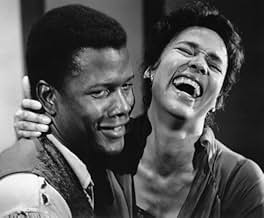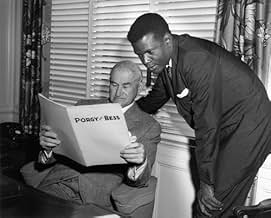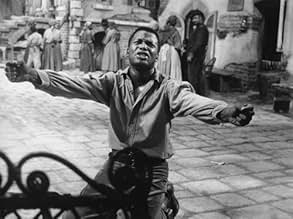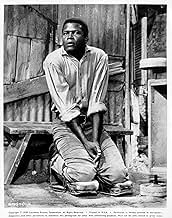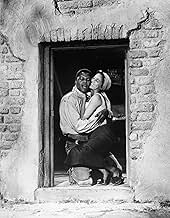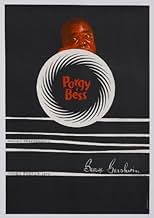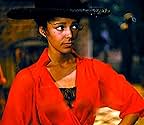A woman whose past is scorned by nearly everyone around her meets a man who'd love her regardlessly - if only everyone else would allow them to.A woman whose past is scorned by nearly everyone around her meets a man who'd love her regardlessly - if only everyone else would allow them to.A woman whose past is scorned by nearly everyone around her meets a man who'd love her regardlessly - if only everyone else would allow them to.
- Won 1 Oscar
- 4 wins & 10 nominations total
Featured reviews
I had the privilege recently of viewing what is said to be the last 35mm, Technicolor, stereo print and found it much livelier and more touching than remembered. Also closer to the original material -- basically, all screenwriter N. Richard Nash did was trim, change much recitative to spoken dialog, and insert a transitional scene or two (including a very amusing one for Pearl Bailey). Oliver Smith's production design is stagy in the "Li'l Abner"-"Guys and Dolls" '50s adaptation mode, but it works well for this work's folkloric, unrealistic quality. Stereotyping and racism are present, but not to a wince-inducing degree. Further, for a movie of its time, it's pretty frank -- the adultery, violent behavior, drug use, and self-destructive habits of the denizens of Catfish Row are not at all minimized in the telling. But there are debits, beginning with all that variation from the stage text. The loss of so much compromises Gershwin's brilliance -- no wonder the family doesn't like it. The reorchestration, especially of Sammy Davis Jr.'s material, is disconcertingly trendy and vulgar. George knew what he was doing, folks; you didn't have to mess with it so much. And while Poitier and Dandridge act well and their singing doubles sing well, there's a huge chasm between the characters' singing and speaking voices -- you're constantly aware of the artifice. What really counts here, of course, is the music, among the greatest ever written for the theater, anywhere. Despite all the tinkering, it survives,and you'd have to be made of stone not to be moved by it. If the treatment isn't entirely to the estate's liking (and it shouldn't be), there's still no reason not to spend some bucks to restore this ambitious filming of Gershwin's masterpiece and make new generations more aware of his genius.
"Porgy and Bess" is an outstanding production of George Gershwin's masterpiece. It is tastefully done in muted colors. The voices are outstanding. Although Sidney Portier's voice is dubbed for his singing portion, he gives a very touching performance. There is a remarkable performance by Sammy Davis Jr. as Sportin Life. There is yet no DVD available for viewing, and this piece begs for one. All intelligent movie goers who enjoyed it in 1959 will appreciate the release of this masterpiece on the new medium. The screen is filled with a dynamic presentation that rivals all other musicals including the outstanding ones by Rodgers and Hammerstein. Be sure to ask for it an your video supplier. Like "Songs of the South" by Walt Disney, it may be the assumption of racial overtones that is preventing the marketing of this cinema.
10olddiscs
I was @ 13 yrs of age when I saw this greatly underappreciated film at The ADAMS theatre in Newark, NJ, I purchased the Program, and later bought the soundtrack... still have both.... I am now 55 + yrs.. and have not seen it since (possibly once on network TV, in 1960's???) One of the greatest casts ever assembled, great score and production , please let another generation see this great film... It was my introduction to opera, and aided with my understanding of Tolerance.. Please family of Gerswhins or Premingers, release this classic soon !!
I first saw the opening of Otto Preminger's "Porgy and Bess" on TV, probably some time in the early 80s, and my younger self found it a bit slow, despite the timeless music. I turned it off
Last night, an extremely rare, cobbled together print screened at the L.A. Cinematheque and it was a bit of a revelation. The performances are strong and memorable. Dorothy Dandridge brings a great deal of vulnerability, strength and subtle (at least by today's standards) eroticism to her part. Sidney Poitier is said to be uncomfortable with the movie, but his performance is terrific, as is Pearl Bailey. Even better are Sammy Davis as the amoral, cat-like Sportin' Life and Brock Peters as the villanious bully Crown.
Still, I'm no fan of Preminger's earlier, leaden -- and far easier to see -- "Carmen Jones." Porgy and Bess" is far superior to that less controversial film -- though that may have to do with the fact that the source material is also far superior.
As seen last night, this is a sturdy but far from perfect work. Not all of the moments quite come alive, and there is some awkwardness in the way the film mixes the overtly stylized Catfish Row set (beautifully done by Oliver Smith) with actual locations. Also, even to my rather untrained ear, some brief portions of the score seem unduly popularized.
Moreover, while this doesn't detract from the achievement of the filmmakers -- Preminger's decision to film almost entirely in wide shots, with no close-ups and occasional medium shots, no doubt rendered it unwatchable on TV "panned and scanned" and may doom it even on widescreen DVDs if it gets the restoration it deserves. On smaller screens, we won't be able to make out the many details that are crucial to the way Preminger staged the film.
Also, the mix heard last night was odd. Many of the vocals, particularly on the opening "Summertime" seemed unduly soft and were overwhelmed by the instrumental music. Perhaps this can be fixed in a restoration.
There is the issue of the film's racial politics. Personally, I see nothing wrong with it, at least in a contemporary context. At the time when so few films depicted strong African-American characters, this may have seemed an unfortunate choice for a big-budget Hollywood film. And, while there may not be much "empowering" here, these are recognizable human beings that are not racial stereotypes. These are operatic characters who make poor choices because that's what tragic characters do. That alone made it a giant stride forward at the time.
In a modern context where strong and heroic African-American characters are less rare (though still not common enough), these characters seem nothing more nor less than human. They truly could be poor and undereducated people of any ethnic background.
Thorny politics aside, the original work is undoubtedly one of the truly great achievements of American music and (secondarily) theater. Poitier, Davis, Dandridge, Peters and, yes Pearl Bailey, were all amazing performers who we'll never see the likes of again. This less than perfect but still solid film clearly deserves to be seen and treasured.
Last night, an extremely rare, cobbled together print screened at the L.A. Cinematheque and it was a bit of a revelation. The performances are strong and memorable. Dorothy Dandridge brings a great deal of vulnerability, strength and subtle (at least by today's standards) eroticism to her part. Sidney Poitier is said to be uncomfortable with the movie, but his performance is terrific, as is Pearl Bailey. Even better are Sammy Davis as the amoral, cat-like Sportin' Life and Brock Peters as the villanious bully Crown.
Still, I'm no fan of Preminger's earlier, leaden -- and far easier to see -- "Carmen Jones." Porgy and Bess" is far superior to that less controversial film -- though that may have to do with the fact that the source material is also far superior.
As seen last night, this is a sturdy but far from perfect work. Not all of the moments quite come alive, and there is some awkwardness in the way the film mixes the overtly stylized Catfish Row set (beautifully done by Oliver Smith) with actual locations. Also, even to my rather untrained ear, some brief portions of the score seem unduly popularized.
Moreover, while this doesn't detract from the achievement of the filmmakers -- Preminger's decision to film almost entirely in wide shots, with no close-ups and occasional medium shots, no doubt rendered it unwatchable on TV "panned and scanned" and may doom it even on widescreen DVDs if it gets the restoration it deserves. On smaller screens, we won't be able to make out the many details that are crucial to the way Preminger staged the film.
Also, the mix heard last night was odd. Many of the vocals, particularly on the opening "Summertime" seemed unduly soft and were overwhelmed by the instrumental music. Perhaps this can be fixed in a restoration.
There is the issue of the film's racial politics. Personally, I see nothing wrong with it, at least in a contemporary context. At the time when so few films depicted strong African-American characters, this may have seemed an unfortunate choice for a big-budget Hollywood film. And, while there may not be much "empowering" here, these are recognizable human beings that are not racial stereotypes. These are operatic characters who make poor choices because that's what tragic characters do. That alone made it a giant stride forward at the time.
In a modern context where strong and heroic African-American characters are less rare (though still not common enough), these characters seem nothing more nor less than human. They truly could be poor and undereducated people of any ethnic background.
Thorny politics aside, the original work is undoubtedly one of the truly great achievements of American music and (secondarily) theater. Poitier, Davis, Dandridge, Peters and, yes Pearl Bailey, were all amazing performers who we'll never see the likes of again. This less than perfect but still solid film clearly deserves to be seen and treasured.
10safado
I have always been a fan of this largely unseen filming of the Gershwin opera, since I last saw it in 1959. As many of you know, it has been unavailable on video or DVD; in fact, the Gershwin family sought to destroy all existing prints.
Yet, for some reason--hopefully signaling an end to its opposition, the Gershwin family recently approved the showing of a collector's print at the Museum of the Moving Image in Astoria, Queens. .
Well, the wide-screen, Technicolor print was excellent! (Not perfect, but excellent.) The sound was outstanding, in road-show quality stereo. The folks who saw this in its original release wouldn't have seen a much better copy. (The program notes include the original Variety review, which cautions that people might balk at the steep limited-release ticket price of $3.50!)
And, as much as I loved it originally, PORGY AND BESS was better than I remembered it. It's just wonderful. Sidney Poitier as Porgy was at the point where his career was just beginning to catch fire, and his charisma shines through. Dorothy Dandridge as Bess is spectacularly beautiful. Brock Peters as Crown is aggressively masculine. Pearl Bailey as Maria provides a few comic moments, although her role is small. And Sammy Davis, Jr., as Sporting Life, steals every scene he's in; he's especially riveting in his two big numbers: "It Ain't Necessarily So" and "There's a Boat that's Leavin' Soon for New York." (That last one won applause in the screening I saw.)
PORGY AND BESS is set-bound, but it really doesn't matter when the set is as gorgeous as this one. The costumes are also outstanding.
Sidney and Dorothy's singing voices are dubbed in, but they are dubbed in extremely well. The exquisite "Summertime" is sung by Clara, played by a young Diahann Carroll; her singing also is dubbed. (Actually, only Pearl and Sammy do their own vocalizing.)
The music is sublime, of course, but what really struck me this time was how much emotion Preminger got out of the story. People were actually sniffling in the audience a number of times--once when Bess sings that beautiful "I Loves You Porgy." And I got a kick out of the audience actually laughing out loud at the lines in "It Ain't Necessarily So." Could it be they had never heard this song before-- or never really listened to it? I believe that much of the emotional impact of this film is due to Poiter and Dandridge's performances--you root for their love to win out.
A minor quibble with the 136 minute running time--one or two slow spot, and a stereotypical, Amos-n-Andy kind of scene about Bess seeing a shyster lawyer to get a divorce from Crown, even though she's not even married to him. (I would have cut that.) And the beginning is a little confusing--both title characters are introduced awkwardly--they're part of the movie before you realize who they are.
And I don't think Preminger used a single close-up in the entire movie. It all seems to be shot in 3/4, which I'm guessing was his way of working with the wide screen.
PORGY AND BESS has always been a cult film for those of us who saw it, for those of us who loved the soundtrack, and for some of us who have only heard about it. Let's hope they find a way to re-release this, and put it out on DVD. It deserves the widest audience possible.
Yet, for some reason--hopefully signaling an end to its opposition, the Gershwin family recently approved the showing of a collector's print at the Museum of the Moving Image in Astoria, Queens. .
Well, the wide-screen, Technicolor print was excellent! (Not perfect, but excellent.) The sound was outstanding, in road-show quality stereo. The folks who saw this in its original release wouldn't have seen a much better copy. (The program notes include the original Variety review, which cautions that people might balk at the steep limited-release ticket price of $3.50!)
And, as much as I loved it originally, PORGY AND BESS was better than I remembered it. It's just wonderful. Sidney Poitier as Porgy was at the point where his career was just beginning to catch fire, and his charisma shines through. Dorothy Dandridge as Bess is spectacularly beautiful. Brock Peters as Crown is aggressively masculine. Pearl Bailey as Maria provides a few comic moments, although her role is small. And Sammy Davis, Jr., as Sporting Life, steals every scene he's in; he's especially riveting in his two big numbers: "It Ain't Necessarily So" and "There's a Boat that's Leavin' Soon for New York." (That last one won applause in the screening I saw.)
PORGY AND BESS is set-bound, but it really doesn't matter when the set is as gorgeous as this one. The costumes are also outstanding.
Sidney and Dorothy's singing voices are dubbed in, but they are dubbed in extremely well. The exquisite "Summertime" is sung by Clara, played by a young Diahann Carroll; her singing also is dubbed. (Actually, only Pearl and Sammy do their own vocalizing.)
The music is sublime, of course, but what really struck me this time was how much emotion Preminger got out of the story. People were actually sniffling in the audience a number of times--once when Bess sings that beautiful "I Loves You Porgy." And I got a kick out of the audience actually laughing out loud at the lines in "It Ain't Necessarily So." Could it be they had never heard this song before-- or never really listened to it? I believe that much of the emotional impact of this film is due to Poiter and Dandridge's performances--you root for their love to win out.
A minor quibble with the 136 minute running time--one or two slow spot, and a stereotypical, Amos-n-Andy kind of scene about Bess seeing a shyster lawyer to get a divorce from Crown, even though she's not even married to him. (I would have cut that.) And the beginning is a little confusing--both title characters are introduced awkwardly--they're part of the movie before you realize who they are.
And I don't think Preminger used a single close-up in the entire movie. It all seems to be shot in 3/4, which I'm guessing was his way of working with the wide screen.
PORGY AND BESS has always been a cult film for those of us who saw it, for those of us who loved the soundtrack, and for some of us who have only heard about it. Let's hope they find a way to re-release this, and put it out on DVD. It deserves the widest audience possible.
Did you know
- TriviaSidney Poitier's singing voice was dubbed by opera singer Robert McFerrin (father of pop singer, classical conductor, and composer Bobby McFerrin).
- Alternate versionsAlthough this film has never been officially released on any home media format, numerous bootleg copies, running 115 minutes, are available on VHS and DVD-R. The full-length original version runs 138 minutes, not including overture and entr'acte music.
- ConnectionsFeatured in Biography: Dorothy Dandridge: Little Girl Lost (1999)
- SoundtracksSummertime
Music by George Gershwin
Lyrics by DuBose Heyward
Sung by Loulie Jean Norman and Women's Chorus
- How long is Porgy and Bess?Powered by Alexa
Details
- Release date
- Country of origin
- Language
- Also known as
- Porgy und Bess
- Filming locations
- Stockton, California, USA(Venice Island - picnic sequence)
- Production company
- See more company credits at IMDbPro
Box office
- Budget
- $7,000,000 (estimated)
- Runtime2 hours 18 minutes
Contribute to this page
Suggest an edit or add missing content

